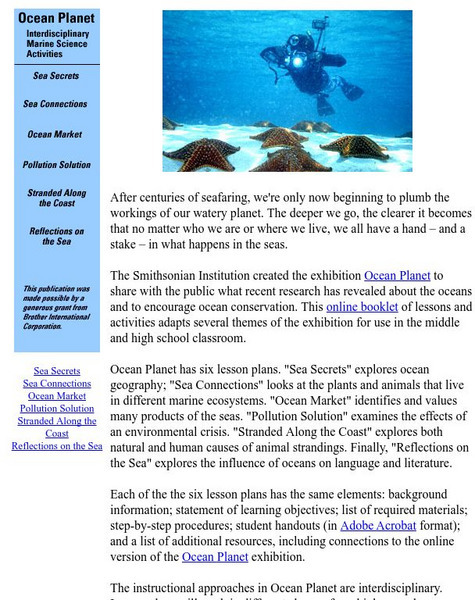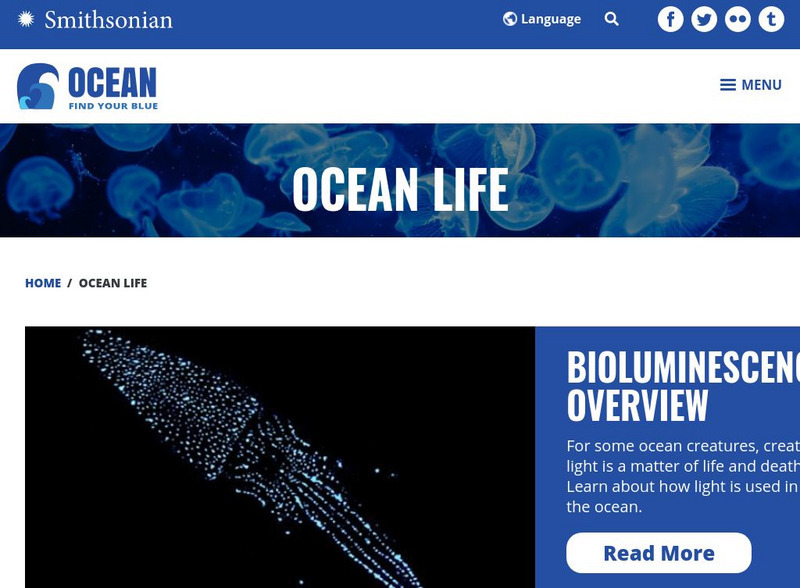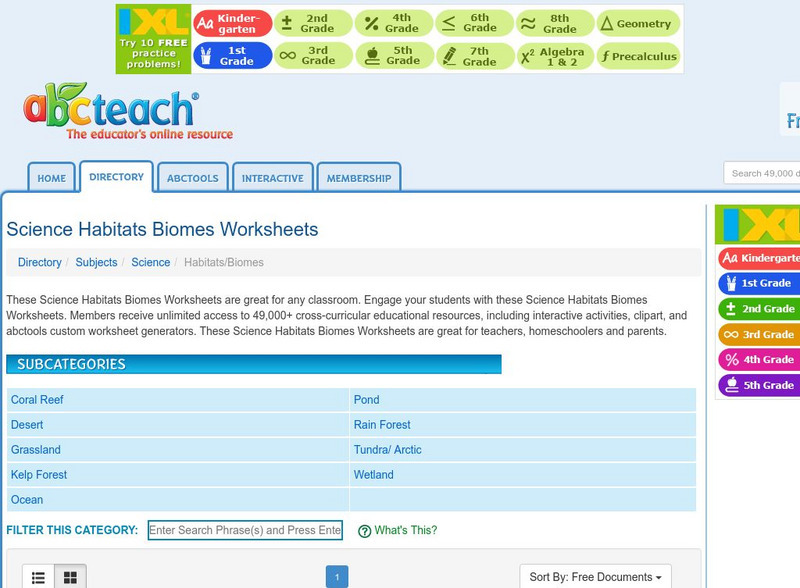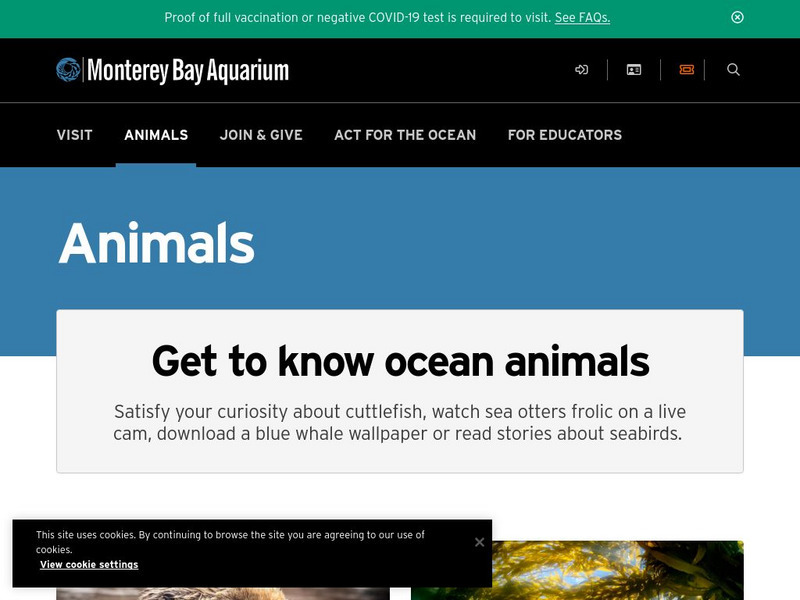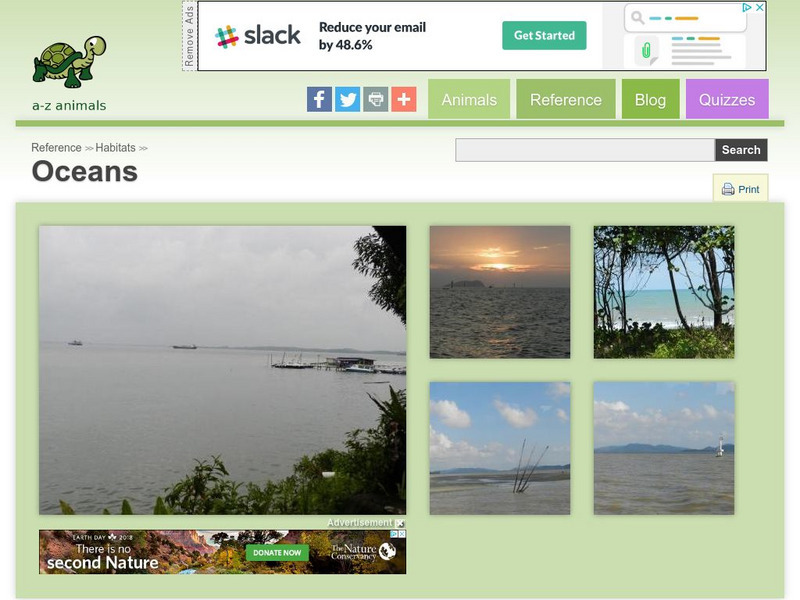Hi, what do you want to do?
Curated OER
Rock Eaters of the Gulf of Alaska
Students compare and contrast the processes of photosynthesis and chemosynthesis. They identify and describe sources of energy used by various organisms for chemosynthesis.
Curated OER
Water Quality Monitoring
Students comprehend the four parameters of water quality. They perform tests for salinity, dissolved oxygen, pH and clarity or turbidity. Students comprehend why scientists and environmental managers monitor water uality and aquatic...
Curated OER
Mountains in the Sea Exploration No Escape
Students study data to hypothesis about the influence of a water circulation cell on the retention of benthic invertebrate larvae in the area of a seamount. They investigate the positives and negatives of larvae retention in this series...
Curated OER
Survival of the Fittest
Sixth graders create their own "never before seen" marine creatures and examine how not all creatures in the sea swim, not all have sharp teeth
Curated OER
Bermuda: Search for Deep Water Caves 2009: Out of Darkness
Young scholars analyze the three models on the origin of troglobitic fauna. In this life science lesson, students also consider how the Zonation model explains the fauna's origin. They also use the Internet to research solutional and...
Wonderville Media
Wonderville: Ocean Habitats
Habitats are places where plants and animals live. There are many different habitats in the oceans of the world. Every plant and animal in the ocean prefers a particular habitat. Learn about Ocean Habitats in this well-constructed...
Smithsonian Institution
Smithsonian: Ocean Planet: Interdisciplinary Marine Science Activities
Smithsonian Institution presents ?Ocean Planet: Interdisciplinary Marine Science Activities?. Through this series of six interdisciplinary lessons, learners will look at such things as the organisms in different marine ecosystems, the...
NOAA
Noaa: Ship Okeanos Explorer: "America's Ship for Ocean Exploration"
Follow teams of scientists as they explore marine life and habitats of the deep ocean. Covers past and current expeditions in various regions of the world. Includes webcasts, videos, lesson plans and modules, and career resources. An...
PBS
Pbs Teachers: Ocean Activity Ideas
Explore ocean habitats, learn about the extreme weather of the ocean and examine environmental threats to the ocean. Conduct experiments on buoyancy and osmosis, and research sailing and ocean-based industry.
Smithsonian Institution
National Museum of Natural History: Ocean Portal: Ocean Life & Ecosystems
From the tiny to the titanic, from the familiar to the undiscovered, the ocean offers a stunning diversity of marine life and nearly every kind of habitat imaginable. Dive in and explore them here. Links incude stories, videos and photos...
NOAA
Noaa: Ocean Explorer: Sea Floor
This resource page has numerous links to pictures and videos of the sea floor. Topics include geologic features, habitats, bacteria mats and hydrates.
PBS
Pbs: Secrets of the Ocean Realm
At this site students can read about sea creatures and ocean plant life, and see pictures of each.
World Wildlife Fund for Nature
Wwf: Our Earth: Ecoregions: Habitats: Oceans
An introduction and overview of the ocean habitat, the largest habitat on Earth. Includes links to information about three animals that live in this habitat.
abcteach
Abcteach: Habitats and Biomes
[Free Registration/Login Required] Find a variety of activities for children to do as they learn to identify varying habitats and biomes. Included are links to an even more extensive list of resources under coral reef, desert, grassland,...
ClassFlow
Class Flow: An Ocean Web Quest
[Free Registration/Login Required] Students embark on an underwater adventure to learn all about ocean habitats, specifically coral reefs and rocky shore, using an Internet based research method. This activity can be completed whole...
NOAA
Noaa: Ocean Facts on Marine Fish Habitats
The depletion of marine fish habitats from NOAA affects more than just the fish - it can affect you too! Learn facts about the importance of habitat preservation for science, and for people like you.
Monterey Bay Aquarium
Monterey Bay Aquarium: Animal Guide
An extensive image-rich field guide to marine habitats and inhabitants, with detailed descriptions and "cool facts" about each.
A-Z Animals
A Z Animals: Reference: Habitats: Oceans
Learn about the ocean ecosystem, and how its characteristics affect the life within it.
NOAA
Noaa: Year of the Ocean, Kids and Teachers Corner
Great resources on a variety of ocean and environmental concerns, endangered plants and animals, climate and habitats, frequently asked questions and fact sheets.
NOAA
Noaa: Stressed Out! [Pdf]
In this lesson, students investigate factors that affect the health of the oceans. These include overfishing, the destruction of habitats, the invasion of foreign species, the impact of pollution, and the increasing acidification. An...
Enchanted Learning
Enchanted Learning: Biomes
Discover the hidden treasures in the different habitats on the earth! The earth is filled with many biomes. Examples of different biomes are listed and include hyperlinks to additional information such as the animals found there.
E-learning for Kids
E Learning for Kids: Science: Pacific Ocean: What Can We Find on a Beach?
Josephine lives on the Marshall Islands. Follow her to the beach and find out what kinds of plants and animals live there.
US Navy
Habitats: Beaches Characteristics
This resource presents an overview of beach structure. This article briefly covers beach features such as spits, tombolos and barrier islands.
The Association of the British Pharmaceutical Industry
Abpi: Human and Animal Habitats
An interactive learning game where students answer whether or not certain environments would be suitable for different animals. Printable worksheets are available for review at the end of the activity.
Other popular searches
- Deep Ocean Habitats
- Deep Ocean Habitats
- Ocean Habitats Year 2
- Science Ocean Habitats
- Ocean Habitats Math
- Ocean Habitats Producers
- Ocean Habitats Inquiry Based
- Ocean Habitats Inquiry
- Ocean Habitats Language Arts
- Powerpoint Ocean Habitats











